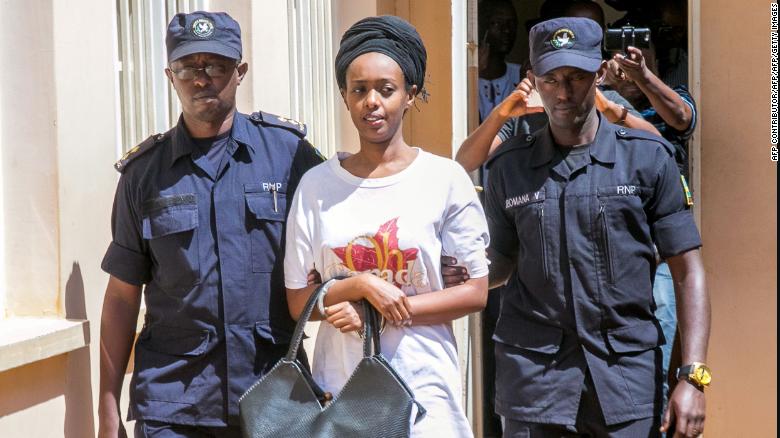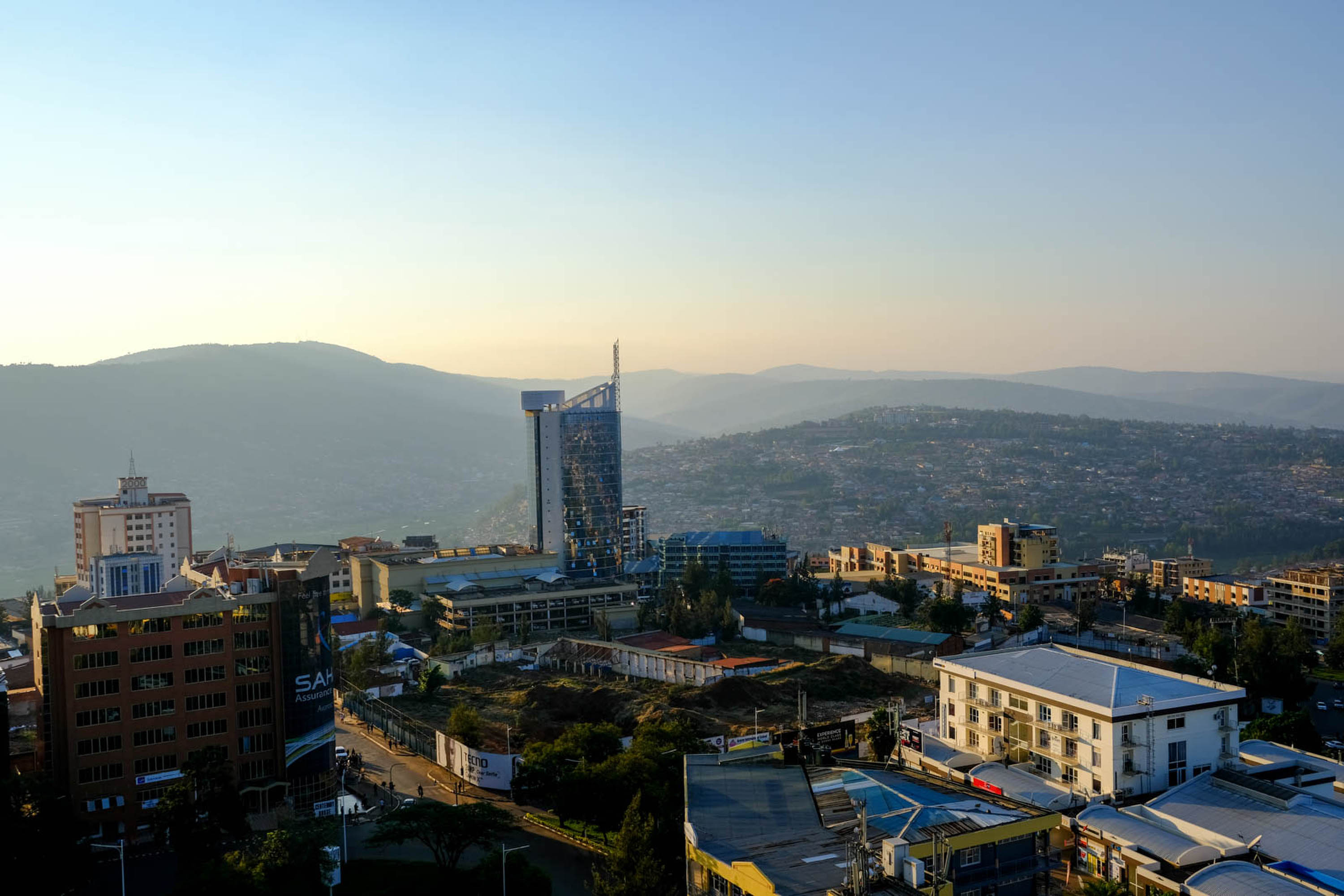US congressional support builds for Rwandan opposition leader
Updated 2150 GMT (0550 HKT) December 4, 2018
CNN -- A group of members of the US Congress are calling on the Rwandan government to drop charges against Diane Rwigara, a fierce government critic who is facing up to 22 years in prison on charges of incitement and fraud.
Rwigara, 37, has long said that the charges against her are politically motivated and stem from her bid to run against President Paul Kagame in the 2017 elections.
Days after she announced her plan to run for office, nude photos -- allegedly of her -- were posted online. Rwigara says the images were digitally altered and used by the government to discredit her as both a female and opposition voice. A spokesman for Kagame's party at the time denied to CNN having anything to do with the photos.
Rwigara was eventually disqualified from contesting the election by electoral authorities, who said she doctored the number of signatures needed to qualify and accused her of submitting the names of dead people. Shortly after, Rwigara launched an activist group to "encourage Rwandans to hold their government accountable," but was soon arrested on charges of incitement and fraud, charges she denies.
Her mother, Adeline, was also arrested on charges of divisionism and inciting insurrection, based on WhatsApp messages exchanged between her and her sister, who lives outside Rwanda.
The pair spent more than a year in prison before they were released on bail in October. They are expected to be sentenced on December 6.
On Tuesday, the Tom Lantos Human Rights Commission, a bipartisan commission of the US House of Representatives, convened a briefing on Rwanda's human rights record and political prisoners that highlighted the Rwigara case.
The commission's co-chairman, Rep. Randy Hultgren, R-Illinois, said the briefing was called "to raise awareness of serious human rights issues occurring in Rwanda."
"Prisoners of conscience who have been arbitrarily imprisoned by the Rwandan government should receive justice and be released," Hultgren said in a statement emailed to CNN.
Rwanda's Office of the President did not immediately respond to CNN's request for comment.
'A chilling expose'
The commission heard from a panel of experts including representatives from Amnesty International and Freedom Now, an organization that represents political prisoners before international human rights courts.
Adotei Akwei, deputy director for advocacy and government relations at Amnesty International USA called the Rwigara case a "chilling expose on the culture of fear and repression that exist in Rwanda," and recommended that the international community call on Kagame and his government to prevent restrictions on, or harassment of opposition politicians, their supporters journalists and human rights defenders.
Kate Barth, Freedom Now's legal director, told the commission the Rwigara case exemplifies many of the violations against government critics in Rwanda.
"Arbitrary detention of government critics is possible because the Kagame administration exercises significant control over the country's judiciary," Barth said.
Akwei and Barth also detailed other human rights violations, citing reports from Human Rights Watch and the US State Department on extrajudicial political assassinations and persecutions against dissidents, issues that Rwigara also sought to bring to the forefront of the national conversation before her imprisonment.
Rwanda's National Police, Office of the President and its ruling political party, the Rwandan Patriotic Front, have not responded to CNN's repeated requests for comment on those allegations.
'Beyond the facade'
Kagame, who has been president since 2000 and a longtime, instrumental leader in Rwanda's modern history, is largely credited with the nation's remarkable turnaround after the social and economic destruction from the 1994 genocide, in which an estimated 800,000 people -- mainly from the Tutsi group -- were killed over the course of 100 days.
His fiscal and social policies also are widely cited as a blueprint for success in the region.
But his critics, like Rwigara, say those policies have come at a cost.
"Kigali is full of nice buildings, but the people live in poverty. The focus of our government has been things, buildings. But they have not been able to build up people's lives. They (Kagame's government) are more interested in impressing the outside -- the West -- than impressing their own people, the Rwandan people," Rwigara told CNN in October.
On Tuesday, Barth also referenced this idea.
"I hope that this briefing will pull back the curtain to reveal the very troubled Rwanda that lies beyond the smooth fa├¦ade," she said, adding that if Kagame "really does want to show the world a nation of remarkable recovery, or peace and prosperity, and perhaps most important, of respect for its citizens' human rights, a terrific place to start would be to release all of the political prisoners and commit the country to ensuring that anyone may speak freely without fear that the inside of a prison cell awaits him or her."
Akwei added that the "vague wording" of laws to prohibit speech have been "misused to stifle legitimate freedom of expression and criminalize criticism of the government," citing the case of another female opposition leader, Victoire Ingabire, who served eight years in jail on charges after comments she made in relation to the genocide.
With the Rwigaras' sentencing hearing quickly approaching, Barth recommended that members of Congress and the US government call on the Rwandan government to release all prisoners of conscience and to raise their concerns about ongoing human rights abuses.
Rep.┬ĀSuzanne Bonamici, D-Oregon, is one of a handful of representatives who are already advocating for Rwigara.
In an impassioned speech on the US House floor on Friday, Bonamici said the charges against Rwigara were "politically motivated" and sought to "quash any criticism of the ruling party, which has gone largely unchallenged for more than 23 years."
Last week, Illinois Democratic Sen. Dick Durbin wrote on Twitter that he is "troubled by what appears to be highly questionable charges against Rwigara for seemingly running for office peacefully." Rep. Ann Wagner , R-Missouri; Sen. Patrick Leahy, D-Vermont; and Rep. Barbara Lee, D-California, have also called for the Rwigaras' release on their official Twitter accounts.
Rwigara told CNN on Tuesday that she was "thankful for the support I have received from both within and outside Rwanda, including the support from US politicians."
She said she does not know if the Rwandan government will listen to their concerns, but that she is "encouraged to see that the injustice happening in my country does not go unnoticed."
"All I know is that I am innocent and I hope I will be acquitted of these fabricated charges," Rwigara said.
"But no matter the outcome, I am ready for it," she added.








